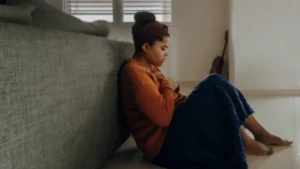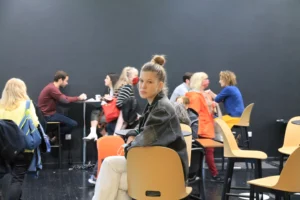People often think social anxiety is narrowed down to random parties and meeting new people, when in reality, it can be present at any large gathering – even when surrounded by loved ones. The unspoken obligation to get along and mingle even with those you just do not connect with can add more stress, and really make the occasion feel more like something you need to conquer rather than enjoy. This may lead you to reconsider attending the event at all, which is a valid option, but one you might be able to avoid making with a few strategies.
But first, what exactly is social anxiety?
Social anxiety is usually triggered when exposed to a large group of people and the feeling cannot be easily switched off or forgotten about. It can surface from the fear of being judged, criticized, or having others ask intrusive questions regarding one’s personal life. It goes beyond mere feelings of shyness or being demure, and can bring people to the point of avoiding others or extreme self-consciousness.
If not addressed or managed, living with Social Anxiety Disorder can greatly affect various aspects of a person’s life and make it difficult for them to forge relationships in their career, school, family, and social scenarios.

It can be quite normal to feel some discomfort in social situations, especially if you do not know or dislike a lot of the people there. This is not exactly a sign of social anxiety. Comfort levels naturally vary within social settings and it all depends on your dynamic with the crowd and personal life experiences. So how can you tell it apart? The following is a list of symptoms that could mean you have social anxiety:
Emotional and behavioral symptoms
· Fear of being negatively judged
· Fear of humiliating yourself
· Worrying about doing or saying something that may cause you to get “kicked out” of the group
· Extreme fear of interacting or talking with others
· Fear that your nervousness is easily recognizable
· Avoiding speaking with others or doing other things that may put you at risk of embarrassing yourself
· Preventing situations wherein you may be the center of attention
· Feeling anxious over an upcoming event or activity
· Over criticizing or over analyzing your performance after a social interaction
· Expecting the worst possible scenarios from a negative interaction
Physical symptoms
· Blushing
· Rapid heart rate
· Shaking
· Sweating
· Having an upset stomach or feeling nauseated
· Having shortness of breath
· Feeling lightheaded
· Spacing out or feeling like you have no clue what to say or how to react
· Feeling your muscles tense up
Symptoms in children
Sometimes children with anxiety express their discomfort by:
· Crying
· Throwing tantrums
· Clinging to parents or someone they are comfortable with
· Refusing to speak with anyone

Social anxiety usually stems from both biological plus environmental factors, and can first be triggered by a negative experience. It is not always a linear process in the sense that sometimes it calms down when you are not overwhelmed or have not been exposed to stimuli recently. Still other times, dealing with a lot of stress, demands, and big changes can make you more sensitive to your personal triggers.
Possible causes of developing social anxiety include, but are not limited to:
It runs in the family. Anxiety can be an inherited trait, but there is not enough evidence to support just how much of it is genetics and how much is due to upbringing or learned behavior.
There may also be a connection between social anxiety and parents who are more controlling over their children, which may lead to a myriad of negative effects such as low self-esteem, lack of confidence, indecisiveness, not knowing how to appropriately act around others, and so on. Social anxiety can also develop in children whereby their parents spared them from working through emotions that naturally arise when trying new things or participating in new activities.
An overactive amygdala. Anxiety can sometimes be caused by our brain structure. The amygdala plays a critical role in controlling the fear response in our system, and some people are naturally born with an overactive or hypersensitive amygdala. This intensifies their responses to fear, which directly heightens anxiety.
Your environment. Social anxiety can be developed after a negative or embarrassing social interaction. Children can later on, as adolescents and adults, feel anxious if they were exposed to bullying, rejection, ridicule, and the like. Situations following that specific occurrence, that may seem similar, can trigger the same feelings.

Now that we know the “ins and outs” of social anxiety, let’s get you prepped and ready for your upcoming events. If there are people that trigger your social anxiety, there are a few healthy ways to handle the situation:
Change the subject. If they start to ask you private questions, give a general response and swiftly change the subject into something that would greatly interest them. Topics like traveling, their hobbies, favorite movie or show, or even their children may be good ones to try.
Excuse yourself. If you are overwhelmed, remove yourself from the situation by excusing yourself. You can say you need to use the restroom, take a phone call outside, or had just remembered a task that you have to fulfill.
Remember you’re not alone. There is a good chance you are not the only one feeling anxious at the event. It is a normal and valid feeling to have. It is often easier to find one or two people you feel comfortable with to strike up a conversation with. This way you are appearing social while also managing your social anxiety.
Seeking professional help. A great way to combat social anxiety is by having a professional guide you through discovering your trigger points and the root cause of it all. It will then be easier to learn the specific strategies to manage your anxiety and prevent intense feelings in the near future. If you believe that you could be suffering from social anxiety, our therapists at ReDiscover Psychological Services can help. Our Edmonton therapists are experienced and trained to help you get to the root cause of your anxiety and help you develop coping strategies. Book a free 15-minute consultation to determine if one of our therapists would be a good match.
